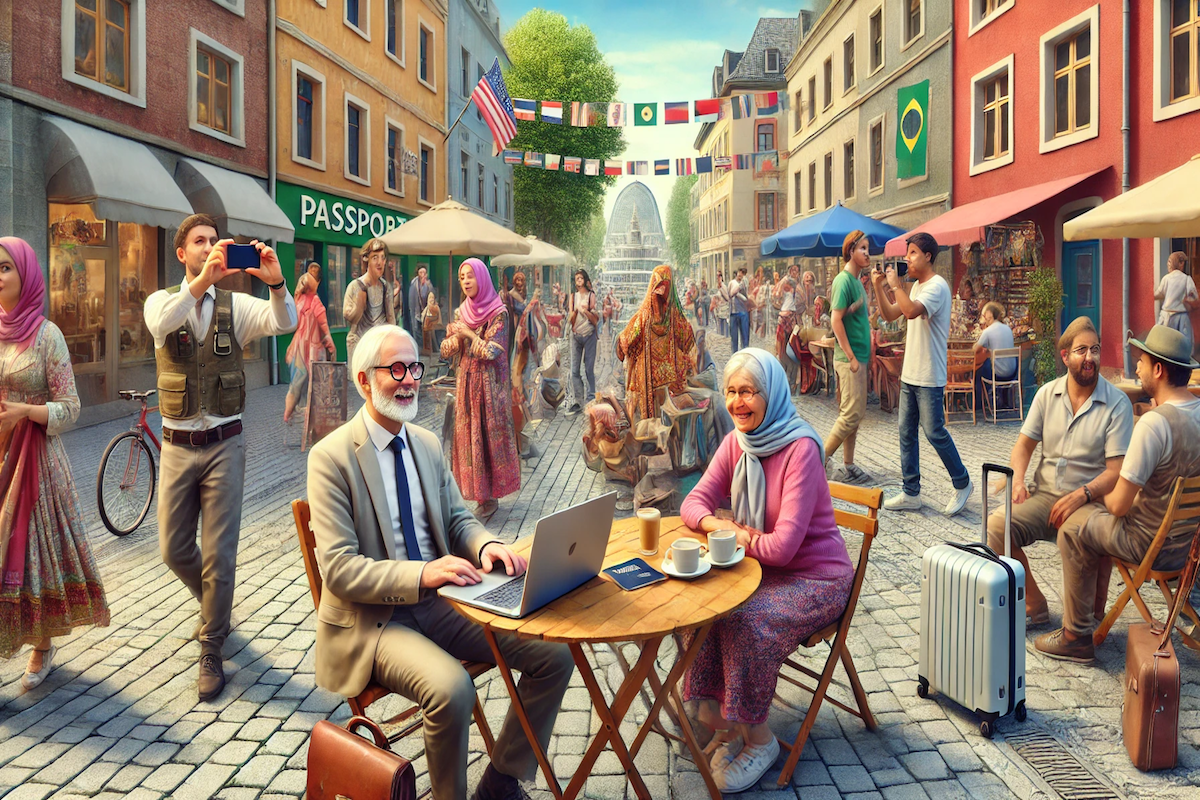Contents
- Lost in Translation: The Wild World of Global Labels
- When ‘Temporary Adventure’ Meets ‘Permanent Wanderlust’
- 1. From Digital Nomads to Vagabonds: The New Breeds of Wanderers
- 2. Why Your Paycheck Determines Your Passport Privilege
- 3. Cultural Integration: Expats Float, Immigrants Plant Roots, and New Wanderers Dance Somewhere in Between
- 4. The Privilege of the Label: Who Decides What You’re Called?
- 5. Are We All Just Immigrants in Denial?
- Final Thoughts: Let’s Drop the Labels (But Keep the Humor)
Lost in Translation: The Wild World of Global Labels
But do these labels even matter, or are we all just assuming?
From digital nomads to newly retired adventurers and passport bros, the modern wanderer is rewriting the rules of living abroad.
Remember, “When you assume, you make an ass out of you and me.”
When ‘Temporary Adventure’ Meets ‘Permanent Wanderlust’
Flashback to 1998. I’m in Ukraine, standing in a bustling bazaar, holding a phrasebook with the hopeful optimism of someone about to butcher a new language.
My goal? Potatoes.
My reality? A vendor shaking their head as I nervously whisper, “Kartofel, pozhaluysta.” (That’s Russian for potatoes, by the way.)
The decision to learn Russian instead of Ukrainian wasn’t mine alone, it was the pragmatic advice of my ex-girlfriend and her family who swore I’d get by easier.
Little did I know, this small choice would lead to years of misadventures, where language wasn’t my only challenge.
But hey, I was an “expat”, not an “immigrant”, right?
Back then, I didn’t even know these labels carried so much weight, or so much comedy.
Fast-forward a few decades, and now we’ve got digital nomads sipping lattes in Bali, retirees stretching their pensions in Portugal, and slow travelers setting up camp wherever the Wi-Fi is strongest.
It’s a glorious, chaotic mix of lifestyles.
But here’s the kicker: no one can agree on what to call themselves either.
1. From Digital Nomads to Vagabonds: The New Breeds of Wanderers
Gone are the days when expats fit neatly into categories.
Now, we’ve got “digital nomads” hopping countries faster than you can say “remote work visa,” “slow travelers” embracing semi-permanence, and “vagabonds” who pack light and live lighter.
Let’s not forget the “newly retired”, who are swapping golf courses for cobblestone streets and café culture.
Oh, and last, but not least (well least on some people’s lists) are the Passport Bro’s, but that’s an article for another time, or not…
Take your average digital nomad. They’re not here to “assimilate”, they’re here for coworking spaces and Insta-worthy sunsets.
Meanwhile, the slow traveler sets down roots for months (or years), soaking in local culture but never quite calling it home.
And the retirees? They’re often mistaken for tourists, until you notice their grocery carts filled with local produce instead of overpriced souvenirs.
But what separates these groups from the old-school expat or immigrant?
It’s not just how they live, it’s how they’re perceived.
And trust me, the paycheck narrative is about to make things even murkier.

2. Why Your Paycheck Determines Your Passport Privilege
Ever notice how expats are glorified as economic assets and experts, while immigrants are scrutinized as job-stealers?
Funny, isn’t it?
Because at the heart of it, we’re all chasing the same thing: a better quality of life. The difference lies in how society views our contributions, or lack thereof.
When I taught English in Kyiv, nobody questioned whether I deserved to be there. I had the right passport, a steady income, and a cozy expat bubble to shield me.
In fact, I was always paid a much higher wage than my local colleagues who had more qualifications and experience. Sound fair?
Meanwhile, immigrants in the country I had left behind were working tirelessly — learning the language, navigating bureaucracy, and hustling harder for far less than I ever had to in my privileged homeland.
And here’s the twist: today’s retirees and digital nomads are complicating this narrative even further.
Retirees stretch their pensions in countries with lower living costs, while digital nomads often bring foreign income streams that barely touch local economies.
Yet somehow, they remain “expats,” not “immigrants.”
Next: What happens when cultural integration feels less like a choice and more like a survival strategy?
3. Cultural Integration: Expats Float, Immigrants Plant Roots, and New Wanderers Dance Somewhere in Between
Here’s where the cobblestone meets the road: immigrants often dive deep, mastering languages, skills and local customs to build a life.
Expats? They tend to skim the surface, staying cozy in their comfort zones.
Throw in digital nomads, slow travelers, and retirees, and the lines blur even more.
I’ll admit, when I first landed in Ukraine, I was firmly Team Expat.
However, my apartment said otherwise.
It was the epitome of former Soviet chic, think electric stove where the settings were, well, warm and wait a while warmer, a huge and heavy old Soviet TV, and the obligatory carpets on the wall.
No IKEA furniture and a pantry stocked with imported peanut butter for this Johnny Expat.
My early attempts at cultural integration?
Let’s just say they were limited to navigating Cyrillic street signs and memorizing Russian phrases like “Mozhno schet?” (Can I have the bill?).
The immigrants I knew back home, however, seemed to dive in headfirst, enrolling their kids in local schools, improving their skill, and becoming fluent in two languages.
Digital nomads and slow travelers bring their own twist to this dynamic.
Nomads are often transient cultural dabblers, hopping between hotspots without fully committing.
Slow travelers stay longer, forging connections but always knowing they’ll leave.
Retirees, meanwhile, can swing either way, some assimilate, while others spend decades in a country without learning more than a handful of phrases.
Here’s the thing: while expats and nomads can float through cultures, immigrants and rooted retirees must engage, navigating citizenship laws or passing a driver’s test without causing a 10 lane pile up.

4. The Privilege of the Label: Who Decides What You’re Called?
Let’s get uncomfortable.
Why is a Brit in Bali an expat, but a Balinese in Birmingham an immigrant?
The answer, unsurprisingly, is privilege. Labels like “expat” and “immigrant” are often defined by race, wealth, and passport status, not by intention or lifestyle.
Once, in a Tbilisi expat Facebook group (where drama thrives), someone asked why we didn’t just call ourselves immigrants.
The responses ranged from defensive to downright absurd: “I’m not an immigrant because I’m here by choice!” Or, “Expats contribute, immigrants take.” My favorite? “I’m here to experience the culture, not to take from it.”
As if living off a remote income in a co-working space while eating imported granola bars and cucumber toast screams “cultural contribution.”
This bias extends to digital nomads and retirees, too.
Nomads are celebrated for their flexibility, even when their impact on the local economy is minimal.
Retirees are welcomed for their purchasing power, but often excluded from deeper cultural conversations.
Immigrants? They’re judged for their economic footprint, despite being the ones truly building bridges.
So, what happens when you realize the label isn’t up to you? Spoiler: You start questioning if the labels matter at all.
5. Are We All Just Immigrants in Denial?
Here’s the heart of the matter: whether you’re a digital nomad, a slow traveler, or a traditional expat, aren’t we all just immigrants with varying degrees of denial?
Moving abroad, in any form, means uprooting your life in search of something new, be it adventure, stability, or a better Wi-Fi signal.
The differences lie in how we frame our narratives, and how society accepts or rejects them.
After 25 years abroad, I’ve worn all the hats. I’ve been the bumbling expat, the transient traveler, and yes, the immigrant filling out endless forms at immigration offices for residency status and work permits.
What I’ve learned is this: the label you carry often says more about societal biases than your actual experience.
So, whether you’re sipping wine at an embassy mixer, fumbling through a market in Russian, or trading nomad tips at a co-working café, the real question isn’t what you call yourself.
It’s how deeply you engage with the place you now call home.

Final Thoughts: Let’s Drop the Labels (But Keep the Humor)
Expats, immigrants, digital nomads, vagabonds, slow travelers, retirees, we’re all just people trying to figure out where we fit in a world that’s constantly shifting.
The labels might help us navigate cocktail parties or visa applications, but they rarely capture the full story.
So, whether you’re blending in, floating above, or dancing somewhere in between, embrace the messiness of it all.
Laugh at your mistakes, share your stories, and maybe, just maybe, try learning the local word for potatoes.
Now it’s your turn: What label do you carry? Or do you reject them altogether?

David Peluchette is a Premium Ghostwriter/Travel and Tech Enthusiast. When David isn’t writing he enjoys traveling, learning new languages, fitness, hiking and going on long walks (did the 550 mile Camino de Santiago, not once but twice!), cooking, eating, reading and building niche websites with WordPress.

